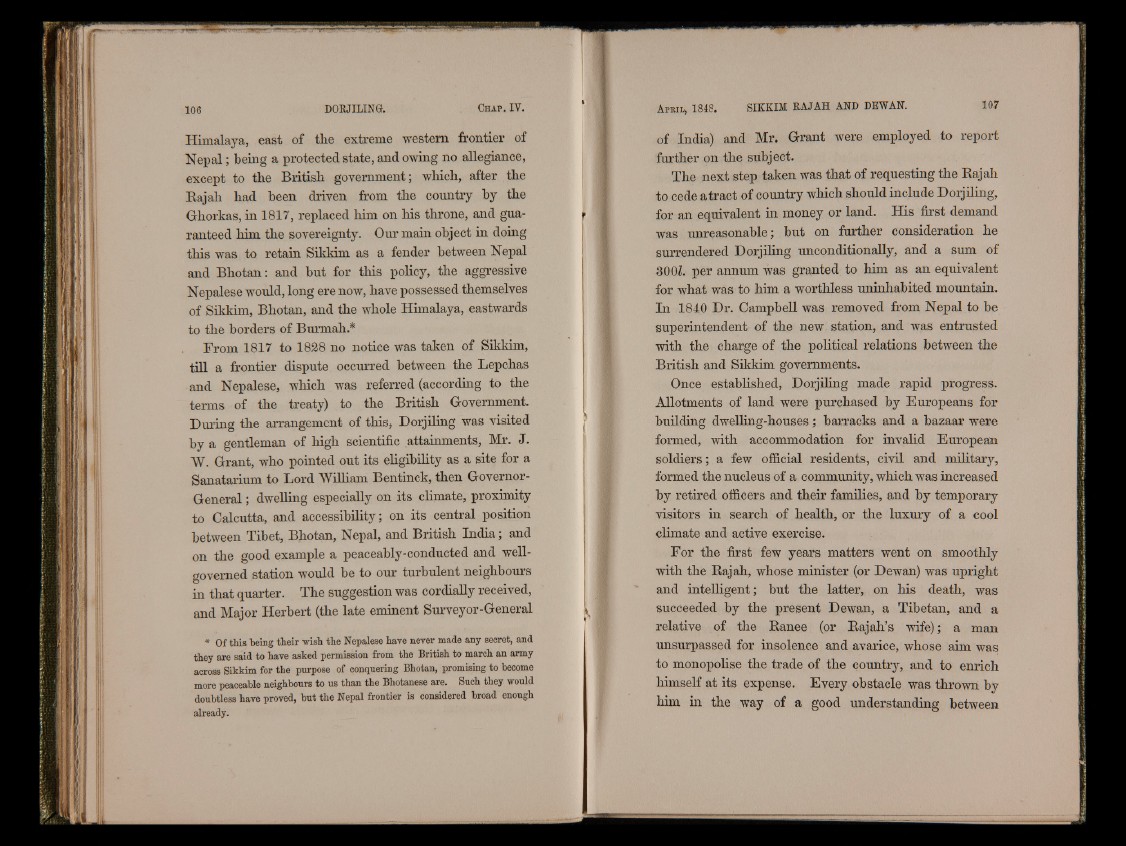
Himalaya, east of the extreme western frontier of
Nepal; being a protected state, and owing no allegiance,
except to the British government; which, after the
Rajah had been driven from the country by the
Ghorkas, in 1817, replaced him on his throne, and guaranteed
him the sovereignty. Our main object in doing
t.Viis was to retain Sikkim as a fender between Nepal
and Bhotan: and hut for this policy, the aggressive
Nepalese would, long ere now, have possessed themselves
of Sikkim, Bhotan, and the whole Himalaya, eastwards
to the borders of Burmah.*
From 1817 to 1828 no notice was taken of Sikkim,
till a frontier dispute occurred between the Lepchas
and Nepalese, which was referred (according to the
terms of the treaty) to the British Government.
During the arrangement of this, Dorjiling was visited
by a gentleman of high scientific attainments, Mr. J .
W. Grant, who pointed out its eligibility as a site for a
Sanatarium to Lord William Bentinck, then Governor-
General ; dwelling especially on its climate, proximity
to Calcutta, and accessibility; on its central position
between Tibet, Bhotan, Nepal, and British India; and
on the good example a peaceably-conducted and well-
governed station would be to our turbulent neighbours
in that quarter. The suggestion was cordially received,
and Major Herbert (the late eminent Surveyor-General
* Of this being their wish the Nepalese have never made any secret, and
they are said to have asked permission from the British to march an army
across Sikkim for the purpose of conquering Bhotan, promising to become
more peaceable neighbours to us than the Bhotanese are. Such they would
doubtless have proved, but the Nepal frontier is considered broad enough
already.
of India) and Mr. Grant were employed to report
further on the subject.
The next step taken was that of requesting the Rajah
to cede a tract of country which should include Dorjiling,
for an equivalent in money or land. His first demand
was unreasonable; but on further consideration he
surrendered Dorjiling unconditionally, and a sum of
300Z. per annum was granted to him as an equivalent
for what was to him a worthless uninhabited mountain.
In 1840 Dr. Campbell was removed from Nepal to be
superintendent of the new station, and was entrusted
with the charge of the political relations between the
British and Sikkim governments.
Once established, Dorjiling made rapid progress.
Allotments of land were purchased by Europeans for
building dwelling-houses; barracks and a bazaar were
formed, with accommodation for invalid European
soldiers; a few official residents, civil and military,
formed the nucleus of a community, which was increased
by retired officers and their families, and by temporary
visitors in search of health, or the luxury of a cool
climate and active exercise.
For the first few years matters went on smoothly
with the Rajah, whose minister (or Dewan) was upright
and intelligent; but the latter, on his death, was
succeeded by the present Dewan, a Tibetan, and a
relative of the Ranee (or Rajah’s wife); a man
unsurpassed for insolence and avarice, whose aim was
to monopolise the trade of the country, and to enrich
himself at its expense. Every obstacle was thrown by
him in the way of a good understanding between